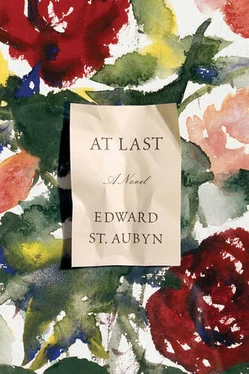Men who married Jonson women didn’t fare much better than the founder’s sons. Eleanor’s father and her Uncle Vladimir were both alcoholics, emasculated by getting the heiress they thought they wanted. They ended up sitting together in White’s, nursing their wounds over a luxurious drink; divorced, discarded, cut off from their children. Eleanor was brought up wondering how an heiress could avoid destroying the man she married, unless he was already too corrupt to be destroyed, or rich enough to be immune. She had chosen from the first category in marrying David, and yet his malice and pride, which were impressive enough to begin with, were still magnified by the humiliation of depending on his wife’s money.
Patrick was not one of the Jonson castrati by marriage, but he knew what it was to be born into a matriarchal world, given money by a grandmother he scarcely knew, and cut off by a mother who still expected him to look after her. The psychological impact of these powerful women, generous from an impersonal distance, treacherous up close, had furnished him with one basic model of what a woman should look like and how she would in fact turn out to be. The object of desire generated by this combination was the Hiso Bitch — Hiso was an acronym for high society invented by a Japanese friend of his. The Hiso Bitch had to be a reincarnation of a Jonson Sister: glamorous, intensely social, infinitely rich in the pursuit of pleasure, embedded among beautiful possessions. As if this was not enough (as if this was not too much) she also had to be sexually voracious and morally disoriented. His first girlfriend had been an embryonic version of the type. He still thought sometimes about kneeling in front of her, in the pool of light from the reading lamp, the shining folds of her black silk pyjamas gathered between her splayed legs, a trickle of blood running down her proffered arm, the gasp of pleasure, whispering, ‘Too much too much,’ the film of sweat on her angular face, the syringe in his hand, her first fix of cocaine. He did his best to addict her, but she was a vampire of a different sort, feeding off the despairing obsession of the men who surrounded her, draining ever more socially assured admirers in the hope of acquiring their sense of belonging, even as she trivialized it in their eyes by making herself seem the only thing worth having and then walking away.
In his early thirties his compulsive search for disappointment brought him Inez, the Sistine Chapel of the Hiso Bitch. She insisted that every one of her cartload of lovers was exclusive to her, a condition she failed to secure from her husband, but successfully extorted from Patrick, who left the relatively sane and generous woman he was living with in order to plunge into the hungry vacuum of Inez’s love. Her absolute indifference to the feelings of her lovers made her sexual receptiveness into a kind of free-fall. In the end the cliff he fell off was as flat as the one Gloucester was made to leap off by his devoted son: a cliff of blindness and guilt and imagination, with no beetling rocks at its base. But she did not know that and neither did he.
With her curling blonde hair and her slender limbs and her beautiful clothes, Inez was alluring in an obvious way, and yet it was easy enough to see that her slightly protruding blue eyes were blank screens of self-love on which a small selection of fake emotions was allowed to flicker. She made rather haphazard impersonations of someone who has relationships with others. Based on the gossip of her courtiers, a diet of Hollywood movies and the projection of her own cunning calculations, these guesses might be sentimental or nasty, but were always vulgar and melodramatic. Since she hadn’t the least interest in the answer, she was inclined to ask, ‘How are you?’ with great gravity, at least half a dozen times. She was often exhausted by the thought of how generous she was, whereas the exhaustion really stemmed from the strain of not giving away anything at all. ‘I’m going to buy six thoroughbred Arab stallions for the Queen of Spain’s birthday,’ she announced one day. ‘Don’t you think it’s a good idea?’
‘Is six enough?’ asked Patrick.
‘You don’t think six is enough? Do you have any idea how much they cost?’
He was amazed when she did buy the horses, less surprised when she kept them for herself and bored when she sold them back to the man she had bought them from. However maddening she was as a friend, it was in the cut and thrust of romance that her talents excelled.
‘I’ve never felt this way before,’ she would say with troubled profundity. ‘I don’t think anybody has really understood me until now. Do you know that? Do you know how important you are to me?’ Tears would well up in her eyes as she hardly dared to whisper, ‘I don’t think I’ve ever felt at home until now,’ nestling in his strong manly arms.
Soon afterwards he would be left waiting for days in some foreign hotel where Inez never bothered to show up. Her social secretary would call twice a day to say that she had been delayed but was really on her way now. Inez knew that this tantalizing absence was the most efficient way to ensure that he would think of nothing but her, while leaving her free to do the same thing at a safe distance. His mind might wander almost anywhere if she was lying in his arms talking nonsense, whereas if he was nailed to the telephone, haemorrhaging money and abandoning all his other responsibilities, he was bound to think of her constantly. When they did eventually meet up, she would hurry to point out how unbearable it had all been for her, ruthlessly monopolizing the suffering generated by her endlessly collapsing plans.
Why would anyone allow himself to be annihilated by such shallowness, unless a buried image of a careless woman was longing for outward form? Lateness, let-down, longing for the unobtainable: these were the mechanisms that turned a powerful matriarchal stimulant into a powerful maternal depressant. Bewildering lateness, especially, took him directly into an early despair, waiting in vain on the stairs for his mother to come, terrified that she was dead.
Patrick suddenly experienced these old emotions as a physical oppression. He ran his fingers along the inside of his collar to make sure that it was not concealing a tightening noose. He couldn’t bear the lure of disappointment any longer, or for that matter the lure of consolation, its Siamese twin. He must somehow get beyond both of them, but first he had to mourn his mother. In a sense he had been missing her all his life. It was not the end of closeness but the end of the longing for closeness that he had to mourn. How futile his longing must have been for him to disperse himself into the land at Saint-Nazaire. If he tried to imagine anything deeper than his old home, he just pictured himself standing there, straining to see something elusive, shielding his eyes to watch a dragonfly dip into the burning water at noon, or starlings twisting against the setting sun.
He could now see that the loss of Saint-Nazaire was not an obstacle to mourning his mother but the only possible means to do so. Letting go of the imaginary world he had put in her place released him from that futile longing and took him into a deeper grief. He was free to imagine how terrified Eleanor must have been, for a woman of such good intentions, to have abandoned her desire to love him, which he did not doubt, and be compelled to pass on so much fear and panic instead. At last he could begin to mourn her for herself, for the tragic person she had been.
Patrick had little idea what to expect from the ceremony. He had been on a business trip to America at the time of his mother’s death and pleaded the impossibility of preparing anything to say or read, leaving Mary to take over the arrangements. He had only arrived back from New York yesterday, just in time to go to Bunyon’s funeral parlour, and now that he was sitting in a pew next to Mary, picking up the order of service for the first time, he realized how unready he was for this exploration of his mother’s confusing life. On the front of the little booklet was a photograph of Eleanor in the sixties, throwing her arms out as if to embrace the world, her dark glasses firmly on and no breathalyser test results available. He hesitated to look inside; this was the muddle, the pile-up of fact and feeling he had been trying to outmanoeuvre since the end of Eleanor’s flirtation with assisted suicide two years ago. She had died as a person before her body died, and he had tried to pretend that her life was over before it really was, but no amount of anticipation could cheat the demands of an actual death and now, with a combination of embarrassment and fear and evasiveness, he leant forward and slipped the order of service back onto the shelf in front of him. He would find out what was in it soon enough.
Читать дальше












